| Srl | Item |
| 1 |
ID:
025695
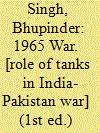

|
|
|
|
|
| Edition |
1st ed.
|
| Publication |
Patiala, B.C.Publishers, 1982.
|
| Description |
xxviii, 296p.: maps, tableshbk
|
|
|
|
|
|
|
|
|
|
|
|
Copies: C:1/I:0,R:0,Q:0
Circulation
| Accession# | Call# | Current Location | Status | Policy | Location |
| 020499 | 954.9045/SIN 020499 | Main | On Shelf | General | |
|
|
|
|
| 2 |
ID:
146389


|
|
|
| 3 |
ID:
190729
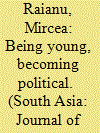

|
|
|
|
|
| Summary/Abstract |
This article discusses the relationship between political subjectivity and urban space in three novels written in the immediate aftermath of the Partition of India: Qurratulain Hyder’s My Temples, Too, Mumtaz Shah Nawaz’s The Heart Divided and Yashpal’s This Is Not That Dawn. Despite extensive thematic and structural similarities, these early Partition novels have never been considered together and through a historical lens. Each narrative features moments of reckoning when the young protagonists are faced with sudden demands to become political in a new way, for example by abandoning secular anti-colonialism for communitarianism. The diversity of their experiences and responses, from bitter resignation to open-ended struggle, reflects the difficulties of constructing unitary selves expressing deep interior convictions aligned with collective identities. These transformations of political subjectivities are situated in and shaped by the heterogeneous urban spaces of Lucknow and Lahore, which establish the conditions of possibility for coexistence and its limits.
|
|
|
|
|
|
|
|
|
|
|
|
|
|
|
|
| 4 |
ID:
115285
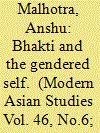

|
|
|
|
|
| Publication |
2012.
|
| Summary/Abstract |
Bhakti is viewed as a movement that is subversive of orthodoxy, and inverts the societal norms prescribed by the dharmashastras. This paper looks at the Bhakti movement's long history and transformations into the nineteenth century in Punjab. If womanly dharma within the normative tradition is defined by sexual containment through marriage and wifehood, the accumulated Bhakti legends and hagiographies are examined to see the place of the prostitute in it, and the limits of its revolutionary potential are brought to the fore. By looking at the writings of the Muslim prostitute Piro who comes to live in the establishment of a 'Sikh' guru Gulab Das, in Chathianwala near Lahore during the period of Ranjit Singh, this paper attempts to read Piro's use of Bhakti legends and imagery to build support for her unusual step. The imbrication of the Gulabdasis in hybrid practices that borrowed elements from advaita, Bhakti and Sufi theologies is also delineated. The paper shows Piro's engagement with the radical potential of Bhakti, but also maps her move towards social conformity-the paradox that makes her look at herself simultaneously as a courtesan and as a consort.
|
|
|
|
|
|
|
|
|
|
|
|
|
|
|
|
| 5 |
ID:
144630
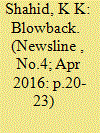

|
|
|
| 6 |
ID:
145329
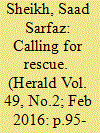

|
|
|
| 7 |
ID:
107402
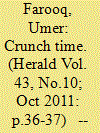

|
|
|
| 8 |
ID:
102274
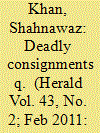

|
|
|
| 9 |
ID:
091814
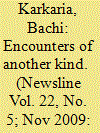

|
|
|
|
|
| Publication |
2009.
|
| Summary/Abstract |
When the venue was Lahore, I would have jumped at the chance even if it was a conference on poodle-grooming. But the invitation was for a gathering of mediawomen, a breed arguably closer to Rotweillers and definitely a greater incentive to seize the opportunity.
|
|
|
|
|
|
|
|
|
|
|
|
|
|
|
|
| 10 |
ID:
158350
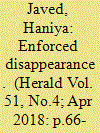

|
|
|
| 11 |
ID:
119745
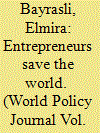

|
|
|
|
|
| Publication |
2012.
|
| Summary/Abstract |
Lahore-Talking over the hum of a power generator, Monis Rahman settles into a plush black chair in a glass-paneled conference room at his offices in Lahore, Pakistan. The midday sun peeks through vertical blinds behind him. Though the power is out yet again, the 40-something tech entrepreneur who runs Naseeb Networks, the job site Rozee.pk, and matchmaking platform Naseeb.com, is unfazed. He's energized about an upcoming event in his country called TiECon, a conference hosted by the Indus Entrepreneurs Network. "We're promoting entrepreneurship in a major way," Rahman says in near-perfect English.
|
|
|
|
|
|
|
|
|
|
|
|
|
|
|
|
| 12 |
ID:
091805
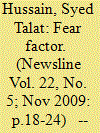

|
|
|
|
|
| Publication |
2009.
|
| Summary/Abstract |
It was the severest hail of bullets I have been under in my career as a soldier. They seemed to come from all directions, intense and unending. It felt like being in the siege of a whole battalion. This is how a colonel described the attack on the General Headquarters (GHQ) on October 10 by a band of 10 terrorist.
|
|
|
|
|
|
|
|
|
|
|
|
|
|
|
|
| 13 |
ID:
051804
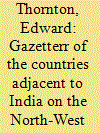

|
|
|
|
|
| Publication |
New Delhi, Asian educational services, 1994.
|
| Description |
402p.Hbk
|
| Standard Number |
8120609379
|
|
|
|
|
|
|
|
|
|
|
|
Copies: C:1/I:0,R:0,Q:0
Circulation
| Accession# | Call# | Current Location | Status | Policy | Location |
| 048056 | 915.21/THO 048056 | Main | On Shelf | General | |
|
|
|
|
| 14 |
ID:
102861
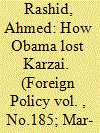

|
|
|
| 15 |
ID:
101077


|
|
|
|
|
| Publication |
2010.
|
| Summary/Abstract |
This article explores how it became possible for the former Indian Prime Minister, Atal Behari Vajpayee, to make a major trust-building initiative with his Pakistani counterpart, Nawaz Sharif, at the 1999 Lahore Summit. Building on security dilemma theorizing in the field of International Relations, the present article develops the concept of a "leap of trust" as a way of understanding how decision-makers trapped in security dilemmas might break through the psychology of distrust by a frame-breaking conciliatory move. This framework is then applied to the moves that led to the development of a trusting relationship between Sharif and Vajpayee. A few months later, Pakistan launched an attack across the Line of Control (LoC) and Vajpayee felt betrayed. I explore how far Sharif knew about his army's plans to attack at Kargil and ask whether he was prisoner of a Pakistani military machine that was intent on pursuing a military solution in Kashmir irrespective of any peace process that might be developing. The article examines the lessons that Vajpayee drew from Kargil and discusses his two further attempts to recover the trust that had developed at Lahore. I conclude with an analysis of the wider lessons of this case for the success of any future leaps of trust that Indian and Pakistani leaders might take.
|
|
|
|
|
|
|
|
|
|
|
|
|
|
|
|
| 16 |
ID:
047436


|
|
|
|
|
| Publication |
New Delhi, Lancer Publishers and Distributors, 2000.
|
| Description |
x, 440p.Hbk
|
| Standard Number |
8170621062
|
|
|
|
|
|
|
|
|
|
|
|
Copies: C:1/I:0,R:0,Q:0
Circulation
| Accession# | Call# | Current Location | Status | Policy | Location |
| 043344 | 923.554/SIN 043344 | Main | On Shelf | General | |
|
|
|
|
| 17 |
ID:
102276
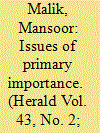

|
|
|
| 18 |
ID:
118862
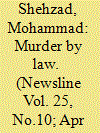

|
|
|
| 19 |
ID:
170473
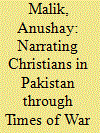

|
|
|
|
|
| Summary/Abstract |
The discussion of Christians in Pakistan usually starts off with them being viewed as a besieged minority without agency which was marginalised further as Pakistan became more ‘Islamic’ through official legislation, particularly under the regime of General Zia ul-Haq in the 1980s. This article attempts to historicise this narrative by focusing on the 1950s and 1960s. It argues that in the early years of Pakistan’s existence, Christians narrated themselves as being important for the very formation of Pakistan and believed that a more equal citizenship was possible, but the environment of political repression under General Ayub Khan, and the war with India in 1965, quickly closed off such possibilities.
|
|
|
|
|
|
|
|
|
|
|
|
|
|
|
|
| 20 |
ID:
103685
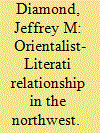

|
|
|
|
|
| Publication |
2011.
|
| Summary/Abstract |
Lahore emerged as a new intellectual centre in northwest India for British Orientalists and Indian intellectuals after the destruction of Delhi during the Great Revolt of 1857. Two prominent individuals who moved to Lahore at this time were Gottlieb Leitner, a philologist and Orientalist scholar, and Maulana Muhammad Hussain Azad, an Urdu poet, literary critic and teacher. Leitner, a naturalised British citizen who studied in Istanbul and completed higher education in Arabic and Turkish in London, became principal of the new Government College in Lahore in 1864. In this position, he exercised a deep influence on education in the northwest by promoting the development and study of vernacular (Urdu language) education, founding and leading a major scientific and literary organisation, the Anjuman-e Punjab. Having aroused strong British opposition, both to his ideas and his combative personality, Leitner's support and assistance from the local literati allowed him to develop and implement his ideas. Leitner's most significant partner was Muhammad Hussain Azad, also a new arrival to Lahore after fleeing Delhi in 1857. Leitner and Azad worked together in the Anjuman-e Punjab to promote their literary and social concerns. They became advocates of neo-Orientalist educational reforms through their public speeches and writing, including works in Urdu intended for, among others, the education of Maulvis. The bracketing of these European and Indian partners is conceptualised in this article through their roles as members of their respective communities as well as outsiders to these very communities. The analysis shows how their complex identities helped them to become highly influential figures in the new cultural environment of post-1857 Lahore.
|
|
|
|
|
|
|
|
|
|
|
|
|
|
|
|